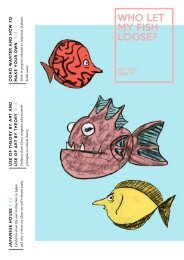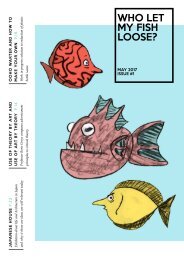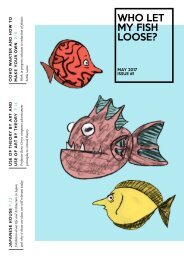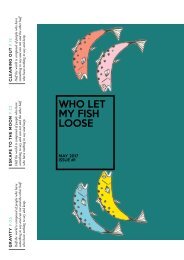*updatemag
Create successful ePaper yourself
Turn your PDF publications into a flip-book with our unique Google optimized e-Paper software.
Issue #1<br />
Who let my fish loose?<br />
opens a possibility of exchange<br />
and makes it unavoidable. I give<br />
to the others what I have, and do<br />
not have, and the others give me<br />
what they have and I do not have.<br />
A society of difference, is a society<br />
of commodity exchange, but<br />
also, exchange of communication.<br />
Communication as exchange of<br />
information and also a market<br />
of opinions. We exchange discourses<br />
and information items<br />
as we exchange all other commodities.<br />
This operation leaves<br />
our identities unchanged. So an<br />
act of exchange itself, be it in<br />
the market or within the framework<br />
of communication leaves<br />
our own identity unchanged. We<br />
require freedom of information<br />
and communication and these<br />
are very important goals. But an<br />
actual, initial goal of theoretical<br />
discourse (and i speak now today<br />
as a theoretician) is not merely<br />
to inform the others about what<br />
opinions I personally have. The<br />
scene of theoretical discourse<br />
does not coincide with the scene<br />
of communication. Rather one<br />
stars a theoretical discourse<br />
with a hope that it will change<br />
the attitude of an audience. The<br />
The Critical theory calls for action.<br />
To change the world instead of<br />
trying to understand it. (a very<br />
famous Marxist slogan) To actively<br />
change life instead of wasting time<br />
for contemplation and passively to<br />
live fully and actively instead of<br />
merely surviving. How is theory<br />
formulated? it is not formulated as a<br />
theory, but as a call.<br />
theoretical discourse wants to be not informative,<br />
but transformative discourse. Thus, every<br />
theoretician is necessarily interested in the<br />
transformative power of discourse as such. In<br />
fact, every theoretical discourse can be read<br />
as the description of the conditions of its own<br />
persuasiveness, and of transformative power of<br />
word in general.<br />
So, an explanation of why a discourse can be<br />
transformative and not only informative. Every<br />
discourse offers a scenario, a set of conditions<br />
under which one can expect that a discourse<br />
becomes transformative. Here, a philosopher,<br />
theoretician, a thinker, discovers an uncanny<br />
similarity between his or her own discourse<br />
and the advertisement that calls its listeners to<br />
change and transform themselves. The theoretician<br />
shares, with the advertisement and fashion<br />
a common possibility of a transformative<br />
call. Transformative word. At the same time,<br />
the traditional philosophy attempts to accuse<br />
all the non-philosophical transformative discourses<br />
of being based not on reason and logic,<br />
but exclusively on seduction and manipulation.<br />
So if you look at the history of religion if you<br />
look at the history of philosophy and theoretical<br />
thought it always operates by this kind of<br />
command:<br />
Come now<br />
Change your attitude<br />
Change your life.<br />
If you go back to Christianity to the period of<br />
enlightenment and you read philosophers like<br />
Deleuze of Derrida, even they suggest similar<br />
things; Don’t think in this direction, begin to<br />
think in another direction and so on. It is not so<br />
much an argumentation to call the change of<br />
your direction of attention and your mind.<br />
There is a common ground between all these<br />
beauty contests and reality shows or what ever,<br />
that we experience in our meditated culture<br />
in a very fundamental attitude of any speaker<br />
including the speaker attempting a critique on<br />
this very subject; Let us not believe them, let<br />
us believe to criticise them, Criticise them now.<br />
Do not delay your critique.<br />
The artists answer this call in its ambiguity.<br />
Why would I say that this call is ambiguous?<br />
15






